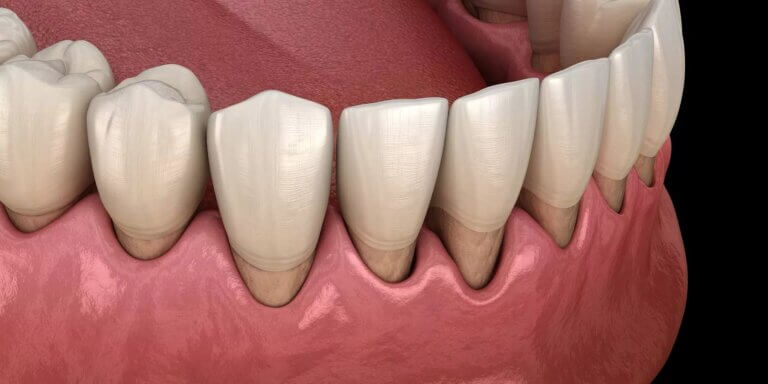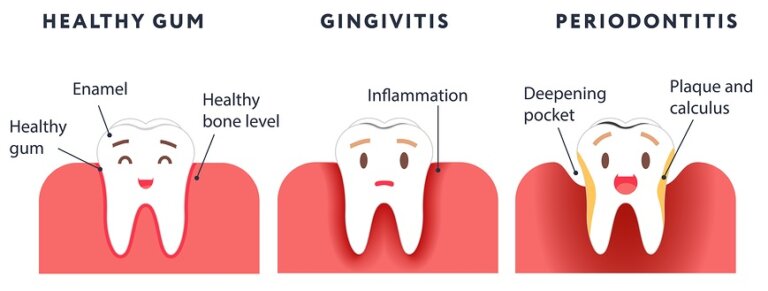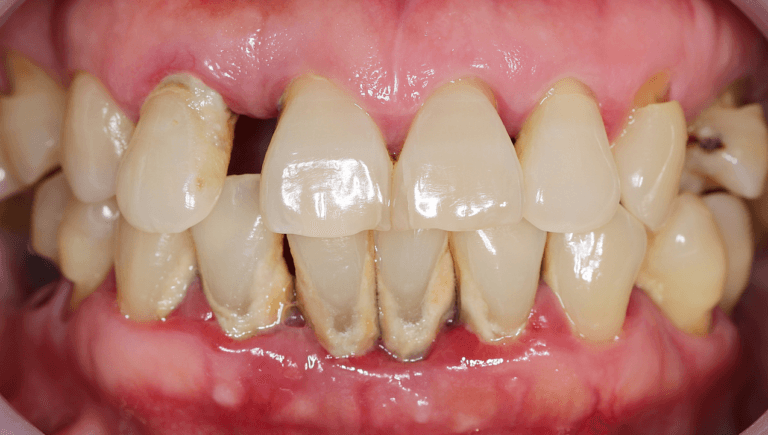Gum Disease

What Is Gum Disease?
Gum Disease, also known as periodontal disease, affects millions of people worldwide and can vary from mild gingivitis to severe periodontitis. It results from poor oral hygiene and the buildup of plaque and tartar on teeth over time, which leads to inflammation and infection in the gums and surrounding bone. Untreated gum disease can lead to tooth loss and other health complications, making it essential to recognize and address the early signs.
Before you contact a Toronto dentist to examine possible Gum Disease, there are some things you should know as a patient:
- Difference Between Gingivitis And Periodontitis
- Why Do I Have Gum Disease?
- Signs And Symptoms Of Gum Disease
- Treatment Options For Gum Disease
- Managing Gum Disease Until You Can See The Dentist
- Frequently Asked Questions About Gum Disease
If you have questions about Gum Disease or other dental problems, please contact us for more information.
Difference Between Gingivitis And Periodontitis
Gum disease exists on a spectrum, ranging from gingivitis to periodontitis:
- Gingivitis: Early-stage gum disease that affects the gums without causing permanent damage to the supporting structures of the teeth. At this stage, bacteria-filled plaque irritates the gums, but the teeth remain firmly anchored in the bone.
- Periodontitis: An advanced form of gum disease where bacteria spread below the gum line, leading to bone and tissue destruction. Over time, this can cause deep pockets around the teeth, bone loss, and even tooth loss.
Since all cases of periodontitis begin with gingivitis, it’s vital to address gum inflammation early. If you experience swollen, bleeding gums or persistent bad breath, consult a dentist for an evaluation. If you have further questions about Gum Disease or gingivitis, please contact us.

Why Do I Have Gum Disease?
Gum disease can stem from a variety of factors, including:
- Poor Oral Hygiene: Infrequent brushing and flossing can lead to plaque and tartar buildup, a primary cause of gum disease.
- Smoking and Tobacco Use: Smoking weakens the immune system, making it easier for gum infections to develop.
- Genetics: Some people may inherit a genetic predisposition to gum disease, increasing their susceptibility.
- Certain Medications: Medications that reduce saliva flow, like antidepressants and blood pressure drugs, can increase the risk of gum disease.
- Health Conditions: Diabetes, heart disease, and immune system disorders like HIV/AIDS can make individuals more prone to gum disease.
- Hormonal Changes: Hormonal fluctuations during pregnancy, puberty, or menopause can heighten gum sensitivity and increase the risk of gum disease.
Maintaining proper oral hygiene and managing underlying health conditions can help reduce the likelihood of developing gum disease. If you have further questions about Gum Disease, please contact us.
Signs And Symptoms Of Gum Disease
Be aware of these common signs of gum disease:
- Red, Swollen, or Tender Gums: Inflammation or tenderness is often a first sign.
- Bleeding Gums: Gums that bleed during brushing, flossing, or eating can indicate gum disease.
- Gum Recession: Gums pulling away from teeth may signal advanced gum disease.
- Persistent Bad Breath: Unresolved bad breath could be due to bacteria associated with gum disease.
- Loose or Shifting Teeth: As the bone supporting teeth breaks down, teeth may loosen.
- Changes in Bite: Misalignment or discomfort when biting down can also be a symptom.
If you experience any of these symptoms, schedule a dental appointment right away. Early detection and treatment are key to maintaining healthy gums. If you have further questions about the signs or symptoms of Gum Disease, please contact us.
Treatment Options For Gum Disease
Treatment for gum disease depends on its severity:
- Professional Cleaning: Regular cleanings remove plaque and tartar above and below the gumline.
- Scaling and Root Planing: A deeper cleaning technique that eliminates bacteria from pockets and smooths tooth roots to prevent future buildup.
- Antibiotic Therapy: Antibiotics can be used to control bacterial infections in the gums.
- Gum Surgery: Severe cases may require surgery to remove diseased tissue or reshape the gums for proper healing.
- Bone and Tissue Grafts: These may be necessary to regenerate lost bone and tissue due to advanced periodontitis.
Discuss with your dentist to find the most suitable treatment approach for your specific needs. Alongside treatment, consistent oral care at home is essential to prevent recurrence. If you have further questions about treatment options for Gum Disease, please contact us.

Managing Gum Disease Until You Can See The Dentist
If you experience gum disease symptoms and cannot see a dentist immediately, try the following steps to manage discomfort at home:
- Brush and Floss Gently: Use a soft-bristled toothbrush to avoid further irritation.
- Rinse with Salt Water: Salt water can help reduce inflammation and bacteria in your mouth. Mix a teaspoon of salt in a glass of warm water, swish for 30 seconds, and spit it out.
- Use Over-the-Counter Pain Relievers: If you’re experiencing pain, you can take ibuprofen or acetaminophen as directed on the label.
- Quit Smoking: Stopping tobacco use can improve your body’s ability to heal and fight infection.
- Apply a Cold Compress: Ice packs or cold compresses can reduce swelling.
- Avoid Hard Foods: Stick to soft foods and avoid irritating the gums further.
- Eat a Nutrient-Dense Diet: A diet high in vitamins C and D, as well as calcium, can help strengthen your immune system and support gum health.
These tips can help manage symptoms until you can see a dental professional. If you have further questions about managing pain related to Gum Disease, please contact us.
Frequently Asked Questions About Gum Disease
- Can gum disease affect overall health?
Yes, gum disease has been linked to systemic conditions like heart disease, diabetes, and stroke. Maintaining oral health is essential for overall well-being.
- How can I prevent gum disease?
Preventive measures include brushing twice daily, flossing regularly, avoiding tobacco, eating a balanced diet, and scheduling regular dental check-ups.
- Can children develop gum disease?
Yes, while less common, children can develop gum disease, especially if they have poor oral hygiene or certain health conditions. Early education on proper dental care is vital.
- Is gum disease contagious?
While not directly contagious, bacteria that contribute to gum disease can be spread through saliva, such as sharing utensils or kissing.
Gum disease is a common yet preventable condition that can have serious consequences if left untreated. If you have further questions about treating or preventing Gum Disease, please contact us.

